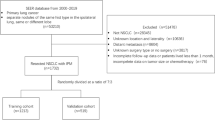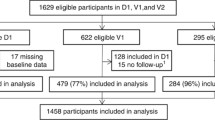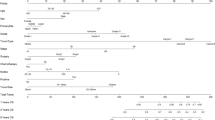Abstract
Lung cancer is the most common and the deadliest type of cancer with 5-year overall survival equal to 15%. One of the main reasons for the high mortality of lung cancer is the development of local and distant metastases. Lung cancer patients mostly die because of distant metastases rather than the primary tumor. Thus, here we tackle the problem of predicting when a patient relapse with a distant metastatic tumor. This information is relevant not only to assess a patient’s prognosis but also to guide the first-line treatment. Here, we applied clinical data from over 400 patients to predict the time to metastatic relapse which is also called metastasis-free survival (MFS). Using Cox regression, we have got a fairly good prediction with a c-index = 0.63 for a model with three clinical covariates. In addition, we created also a nomogram that could be applied to predicting the probability of metastases in newly diagnosed patients. In conclusion, solely based on clinical data, it is possible to predict the time to metastasis.
Access this chapter
Tax calculation will be finalised at checkout
Purchases are for personal use only
Similar content being viewed by others
References
Gridelli, C., Rossi, A., Carbone, D.P., et al.: Non-small-cell lung cancer. Nat. Rev. Dis. Primers 1(1), 1–16 (2015). https://doi.org/10.1038/nrdp.2015.9
Adamek, M., Biernat, W., Chorostowska-Wynimko, J., et al.: Lung cancer in Poland. J. Thorac. Oncol. 15, 1271–1276 (2020). https://doi.org/10.1016/J.JTHO.2020.03.035
Jones, G.S., Baldwin, D.R.: Recent advances in the management of lung cancer. Clin. Med. 18, s41 (2018). https://doi.org/10.7861/CLINMEDICINE.18-2S-S41
Popper, H.H.: Progression and metastasis of lung cancer. Cancer Metastasis Rev. 35(1), 75–91 (2016). https://doi.org/10.1007/s10555-016-9618-0
Kozłowska, E., Suwiński, R., Giglok, M., et al.: Mathematical model predicts response to chemotherapy in advanced non-resectable non-small cell lung cancer patients treated with platinum-based doublet. PLoS Comput. Biol. 16 (2020). https://doi.org/10.1371/journal.pcbi.1008234
Kozłowska, E., Świerniak, A.: The stochastic mathematical model predicts angio-therapy could delay the emergence of metastases in lung cancer. In: Pijanowska, D.G., Zieliński, K., Liebert, A., Kacprzyk, J. (eds.) Biocybernetics and Biomedical Engineering – Current Trends and Challenges. LNNS, vol. 293, pp. 64–73. Springer, Cham (2022). https://doi.org/10.1007/978-3-030-83704-4_7
Siegel, R.L., Miller, K.D., Fuchs, H.E., Jemal, A.: Cancer statistics. CA: Cancer J. Clin. 71, 7–33 (2021). https://doi.org/10.3322/caac.21654
Zhang, C., Song, Q., Zhang, L., Wu, X.: Development of a nomogram for preoperative prediction of lymph node metastasis in non-small cell lung cancer: a SEER-based study. J. Thorac. Dis. 12, 3651–3662 (2020). https://doi.org/10.21037/JTD-20-601
Shan, Q., Shi, J., Wang, X., et al.: A new nomogram and risk classification system for predicting survival in small cell lung cancer patients diagnosed with brain metastasis: a large population-based study. BMC Cancer 21(1), 1–8 (2021). https://doi.org/10.1186/S12885-021-08384-5
Qi, Y., Wu, S., Tao, L., et al.: Development of nomograms for predicting lymph node metastasis and distant metastasis in newly diagnosed T1-2 non-small cell lung cancer: a population-based analysis. Front. Oncol. 11 (2021). https://doi.org/10.3389/FONC.2021.683282
Acknowledgments
We would like to acknowledge the financial support of the National Science Center, Poland - grant number 2020/37/B/ST6/01959 and EMBO short fellowship.
The work was partially carried out during a research visit at Inria (Marseille, France). We thank the leader of the visiting laboratory – Sebastien Benzekry for fruitful discussion and valuable comments.
Author information
Authors and Affiliations
Corresponding authors
Editor information
Editors and Affiliations
Rights and permissions
Copyright information
© 2022 The Author(s), under exclusive license to Springer Nature Singapore Pte Ltd.
About this paper
Cite this paper
Kozłowska, E., Giglok, M., Dębosz-Suwińska, I., Suwiński, R., Świerniak, A. (2022). Predicting Metastasis-Free Survival Using Clinical Data in Non-small Cell Lung Cancer. In: Szczerbicki, E., Wojtkiewicz, K., Nguyen, S.V., Pietranik, M., Krótkiewicz, M. (eds) Recent Challenges in Intelligent Information and Database Systems. ACIIDS 2022. Communications in Computer and Information Science, vol 1716. Springer, Singapore. https://doi.org/10.1007/978-981-19-8234-7_18
Download citation
DOI: https://doi.org/10.1007/978-981-19-8234-7_18
Published:
Publisher Name: Springer, Singapore
Print ISBN: 978-981-19-8233-0
Online ISBN: 978-981-19-8234-7
eBook Packages: Computer ScienceComputer Science (R0)




